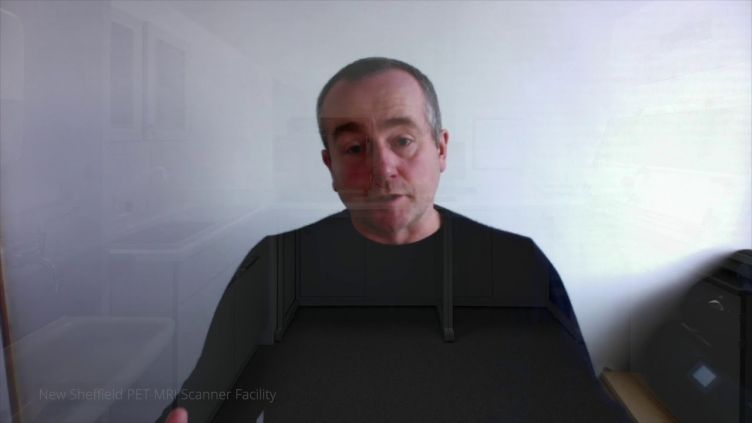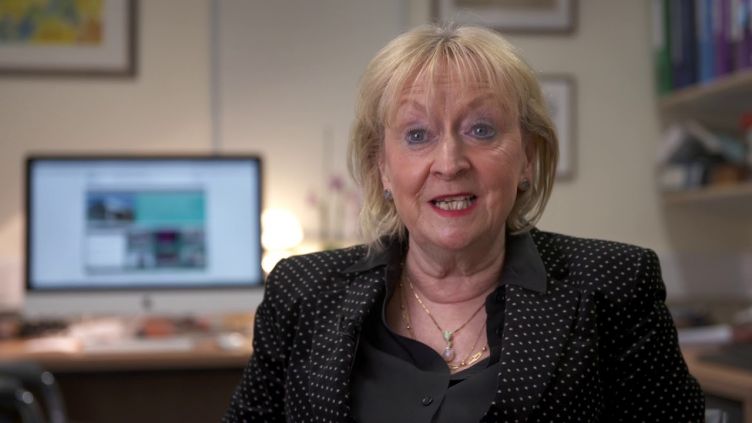Sheffield PET-MRI facility
The Sheffield PET-MRI facility is the UK’s 8th and Yorkshire’s only PET-MRI facility. It is set in a purpose built state-of-the-art facility that is attached to the existing University of Sheffield MRI unit at the Royal Hallamshire Hospital.

Virtual tour
View the full screen virtual tour
Sheffield PET-MRI scanner
The Sheffield PET-MRI scanner is providing unprecedented views inside the human body by combining the power of both MRI and PET images in a single scan. It is helping our scientists and medics to tackle some of the most devastating diseases affecting millions of people.
The scanner is a 3T GE PET-MRI system that is equipped with a time of flight PET detector and full multi-nuclear MRI capability for complementary functional and structural imaging of the whole-body. There are huge advantages in combining the ability of PET to detect and quantify disease processes with the ability of MRI to provide detailed anatomical and functional information.
The new facility is enhancing our medical research, and allowing us to take exciting discoveries into clinical trials to give patients in Yorkshire access to ground-breaking new treatments.
The PET-MRI scanner will speed up the diagnosis of, and lead to the development of new treatments for some of the most devastating diseases including:
- Neurodegenerative and neuroinflammatory diseases including dementia, multiple sclerosis, Parkinson’s disease and motor neuron disease (MND)
- Epilepsy
- Cardiovascular disease
- Lung disease
- Diabetes
- Cancer
- Infectious diseases
- Kidney disease
Current research projects powered by PET-MRI
The PET-MRI facility is already enabling several new research projects to take place here at Sheffield. You can read about two examples below.
- Pain in patients with diabetes
-
A team of researchers at Sheffield, including Dr Dinesh Selvarajah, are looking for more effective pain relieving drugs for patients who have suffered nerve damage as a result of their diabetes.
One in 16 people in the UK has diabetes and half of these develop nerve damage. This can cause severe pain in the feet and legs. Unfortunately, current medications provide only partial benefit for some, with many enduring inadequate pain relief. Part of the problem is that current treatments at best achieve partial pain relief in only one in three patients. Hence, new targets need to be identified in order to develop more effective drugs for painful diabetic nerve damage.
The studies that have been conducted to date have examined brain activation using MRI only. However, this latest study, involving 40 patients in Sheffield, is performing combined PET and MRI scans to provide a more direct readout of brain activity in response to pain.
This will provide new insights into where and how nerve damage leads to chronic pain in diabetes.
A better understanding of this process will lead to new therapeutic targets for patients with painful diabetic nerve damage.
- Identifying risks of dementia
-
There are several different causes of cognitive problems in later life, including a condition called Mild Cognitive Impairment (MCI) as well as different types of dementia like Alzheimer’s disease, frontotemporal dementia or Lewy body disorders. A person's risk of developing dementia is one in 14 over the age of 65, which jumps to one in six over the age of 80.
Lewy body disorders share many symptoms with the more widely known conditions such as Alzheimer's disease, making misdiagnosis a common problem. However, Lewy body disorders are currently understudied compared with many other forms of dementia and react negatively to certain medications for Alzheimer's disease, so better diagnosis and treatments need to be developed for these conditions.
In recent years there has been an increasing effort to better understand changes in people with mild cognitive problems as some people might go on to develop features suggestive of Alzheimer’s disease, Lewy body disorders or other conditions.
The study underway in Sheffield is looking at patients with MCI in order to help identify changes that could lead to better diagnosis for other conditions and therefore developments of treatments that are more specific.
With the new PET- MRI scanner researchers can measure damaged protein (amyloid) that can be present in people with both Alzheimer's disease and Lewy body disorders. Patients with amyloid pathology often progress faster, so knowing whether or not a patient has this damaged protein can enable them to gain access to new anti-amyloid treatments that are emerging.
Your support fundraising for the Sheffield Scanner appeal
Following an appeal, launched by the University of Sheffield in 2017, the new PET-MRI facility was supported by thousands of donations from people across the region and around the globe, who helped bring the revolutionary scanner to Yorkshire. Your donations and support through fundraising activities like the Big Walk raised over £2 million towards the £10 million cost of the project.
As a way of showing our thanks we have included displays within the new facility, that celebrate everyone who helped make the Sheffield PET-MRI facility possible.
View the Donor Stories Board in detail (Flickr)





